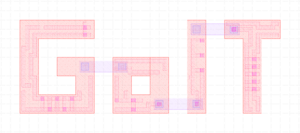Main Page: Difference between revisions
(Rollback to last approved version) Tag: Undo |
No edit summary |
||
| Line 37: | Line 37: | ||
#* [https://orcid.org/0000-0003-1059-5338 Piedad Brox Jiménez], [http://www.imse-cnm.csic.es/home.php Instituto de Microlelectronica de Sevilla] | #* [https://orcid.org/0000-0003-1059-5338 Piedad Brox Jiménez], [http://www.imse-cnm.csic.es/home.php Instituto de Microlelectronica de Sevilla] | ||
#* [https://dargcsic.github.io/ David Arroyo Guardeno], [https://www.itefi.csic.es/es Instituto de Tecnologías Físicas y de la Información] | #* [https://dargcsic.github.io/ David Arroyo Guardeno], [https://www.itefi.csic.es/es Instituto de Tecnologías Físicas y de la Información] | ||
#* [https://orcid.org/0000-0003-3025-5736 Macarena Cristina Martínez Rodríguez], [http://www.imse-cnm.csic.es/home.php Instituto de Microlelectronica de Sevilla] | |||
#* Pablo Navarro Torrero, [http://www.imse-cnm.csic.es/home.php Instituto de Microlelectronica de Sevilla] | #* Pablo Navarro Torrero, [http://www.imse-cnm.csic.es/home.php Instituto de Microlelectronica de Sevilla] | ||
# FibraServi (FS), Belgium | # FibraServi (FS), Belgium | ||
#* Staf Verhaegen ([https://fosstodon.org/@Chips4Makers @Chips4Makers@fosstodon.org], [https://gitlab.com/FatsieFS FatsieFS@gitlab]) | #* Staf Verhaegen ([https://fosstodon.org/@Chips4Makers @Chips4Makers@fosstodon.org], [https://gitlab.com/FatsieFS FatsieFS@gitlab]) | ||
# G-INP/CIME-P, France | # G-INP/CIME-P, France | ||
#* Jeremy Perret, CIME-P, a team within [http://www.cime.inpg.fr/ CIME Nanotech], a lab from [https://www.grenoble-inp.fr/ G-INP] | #* Jeremy Perret, CIME-P, a team within [http://www.cime.inpg.fr/ CIME Nanotech], a lab from [https://www.grenoble-inp.fr/ G-INP] | ||
#* Aurélien Nicolet, CIME-P, a team within [http://www.cime.inpg.fr/ CIME Nanotech], a lab from [https://www.grenoble-inp.fr/ G-INP] | #* Aurélien Nicolet, CIME-P, a team within [http://www.cime.inpg.fr/ CIME Nanotech], a lab from [https://www.grenoble-inp.fr/ G-INP] | ||
=Results= | |||
* 2023.7.10-12, the [https://wiki.f-si.org/index.php/FSiC2023 Free Silicon Conference (FSiC2023)] took place in Sorbonne Université, Paris, France | |||
* 2023.11.3, FSI publishes a [https://wiki.f-si.org/index.php?title=Recommendations_and_roadmap_for_the_development_of_open-source_silicon_in_the_EU list of recommendations and a roadmap for the development of open-source silicon in the EU] | |||
=Newsletters= | |||
* 2023.9.23, CSIC publishes a [https://wikint.goit-project.eu/images/d/da/Newsletter_GoIT_M6.1_new.pdf newsletter about open initiatives in hardware security] | |||
=Contact= | =Contact= | ||
| Line 49: | Line 56: | ||
=See also= | =See also= | ||
* [[Related conferences]] | |||
* [ | * [[Related EU projects]] | ||
* [ | |||
Revision as of 21:11, 30 January 2024
The Go IT! is an EU Coordination and Support Action (CSA) about Open Source Hardware for ultra-low-power, secure processors funded under cluster 4 (Digital, Industry and Space), of Horizon Europe. The project was submitted on October 21 2021, was awarded on March 18 2022 and started on September 1 2022. Its planned duration is three years. The project number (ID) is 101070660.
Proposal short summary
Europe's IT hardware development is constantly challenged by outrageously expensive development tools, legal constraints like NDAs or patents, lock-in threats, dependency from external vendors or supply chains and foreign political events. Europe’s digital infrastructure (from consumer to critical appliances) is heavily relying on foreign closed-source chips which are literally black-boxes which may (and have been proven to) contain malicious features. This situation makes the hardware development expensive and inefficient, and undermines the very principles of sovereignty, resilience and re-usability. Open-source silicon chips, which are open in their entirety, i.e. down to the physical layout, carry the potential of catapulting Europe into a renaissance of digital technology. Several challenges are on the way, many of which will require the participation of the stakeholders (from the fertile ground made of “nerdy” hobbyists and makers who are the early protagonists of the scene, all the way up to large enterprises), as well as the participation of policymakers and regulatory bodies. The road ahead is steep, but rich of rewards. Therefore we loudly say: Go IT!
Proposal manuscript
The manuscript of the submitted proposal can be downloaded (here).
Goals
The main goals of the project can be summarized as follows:
- Feedback the policymakers with technical reports and roadmaps
- Facilitate the creation of a complete and complementary know-how for open-source chip design across European universities
- Organize three editions of the Free Silicon Conference
- Develop a GPL-compatible forever-open (copyleft) licence for silicon chips
- Include the available open-source PDK in existing open-source design flows
- Create a repository of open-source EDA tools and hardware blocks
- Package open-source tools into mainstream GNU/Linux distributions
- Disseminate the existing open-source tools and libraries on mainstream channels like Wikipedia
- Promote the concept of open-source silicon chips through the participation at mainstream conferences, talks and paid advertisement
- Contribute to standardization and certification activities for open-source silicon chips
Consortium
- Elektronikas un Datorzinatnu Instituts (EDI), Latvia (coordinator)
- Sorbonne Université (SU), France
- Free Silicon Foundation (I) ETS, Italy
- Agencia Estatal Consejo Superior de Investigaciones Cientificas (CSIC), Spain
- FibraServi (FS), Belgium
- Staf Verhaegen (@Chips4Makers@fosstodon.org, FatsieFS@gitlab)
- G-INP/CIME-P, France
- Jeremy Perret, CIME-P, a team within CIME Nanotech, a lab from G-INP
- Aurélien Nicolet, CIME-P, a team within CIME Nanotech, a lab from G-INP
Results
- 2023.7.10-12, the Free Silicon Conference (FSiC2023) took place in Sorbonne Université, Paris, France
- 2023.11.3, FSI publishes a list of recommendations and a roadmap for the development of open-source silicon in the EU
Newsletters
- 2023.9.23, CSIC publishes a newsletter about open initiatives in hardware security
Contact
All the members of the consortium can be contacted at once by writing at mail' 'at' goit-project.eu.
